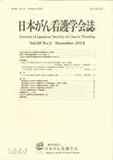Japanese
English
- 販売していません
- Abstract 文献概要
- 参考文献 Reference
- サイト内被引用 Cited by
要旨
本研究の目的は,外来で分子標的治療を受けるがん患者の症状体験とQOLとの関連を明らかにすることである.上皮成長因子受容体(EGFR)阻害薬による分子標的治療を受けているがん患者29名(平均年齢63.9歳)を対象とし,自記式質問紙調査法と診療録からのデータ収集による調査を行った.質問紙は,個人属性,症状体験(がん患者用の症状評価尺度MDASI-Jと皮膚症状の強さ),QOL(QOL-ACD)で構成した.
分析の結果,症状体験の下位尺度である「症状の強さ」は,QOL-ACDの下位尺度である活動性(rs=−.75;p<.01),身体状況(rs=−.58;p<.01),精神・心理状態(rs=−.44;p<.05),社会性(rs=−.47;p<.05)と,「症状による生活への支障」は,活動性(rs=−.78;p<.01),身体状況(rs=−.56;p<.01),精神・心理状態(rs=−.64;p<.01), 社会性(rs=−.55;p<.01)の4下位尺度および全般的QOL(rs=−.43;p<.05)と,「皮膚症状の強さ」は,活動性(rs=−.54;p<.05),身体状況(rs=−.60;p<.01)と有意な負の相関がみられた.外来で分子標的治療を受けるがん患者のQOL向上のためには継続した症状マネジメントの重要性が示唆された.
The purpose of this study was to clarify the relationship between symptom experience and quality of life (QOL) in cancer outpatients receiving molecular targeted therapy. Participants were 29 cancer outpatients (mean age:63.9 years) receiving anti-EGFR targeted therapy. Data were collected from a self-administered questionnaire and the patients' medical records. The questionnaire included items on the patient's background, symptom experience (symptom severity and symptom interference items from the Japanese version of the M.D. Anderson Symptom Inventory, and skin symptom severity items), and QOL (Quality of Life Questionnaire for Cancer Patients Treated with Anticancer Drugs;QOL-ACD).
Data analyses clarified the relationship between symptom experience and QOL in cancer outpatients. Significant inverse correlations were observed between:“symptom severity items” and four QOL subscales [Daily-life activities (rs=−.75;p<.01), Physical condition (rs=−.58;p<.01), Psychological condition (rs=−.44;p<.05), Social attitude (rs=−.47;p<.05)];“symptom interference items” and the zd scale (rs=−.43;p<.05), and four QOL subscales [Daily-life activities (rs=−.78;p<.01), Physical condition (rs=−.56;p<.01), Psychological condition (rs=−.64;p<.01), Social attitude (rs=−.55;p<.01)];“skin symptom severity items” and two QOL subscales [Daily-life activities (rs=−.54;p<.05), Physical condition (rs=−.60;p<.01)].
These findings suggest the importance of providing continued symptom management for cancer outpatients receiving molecular targeted therapy in order to improve their QOL.
Copyright © 2014, Japanese Society of Cancer Nursing All rights reserved.


